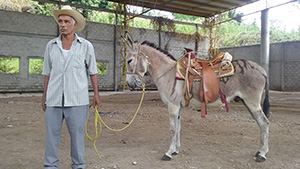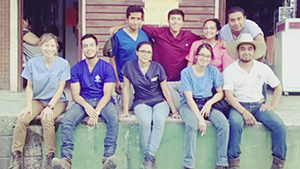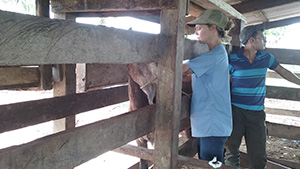Andria Lessler - Mexico
Andria Lessler - Mexico
While I have many unknowns about the future course of my veterinary career, one thing I know for certain is that I want to explore how I can apply a veterinary degree to improving not only the lives of individual animals, but also community and ecological health. Knowing that this emerging field of One Health can have many professional incarnations, I sought out an Office of Global Programs International Summer Externship as a means to gain on the ground field experience.
I focused my sights on a project and region where I could integrate my interest in equine medicine with community health. With the help of my mentor, Dr. Eric Davis, I developed a proposal to travel to Egypt to work with local veterinarians from The Donkey Sanctuary, an international working equid welfare organization, to conduct a research project on high incidence paraocular lesions reported in donkeys working on the Nile Delta. Unfortunately, in the spring of 2016 the political climate in Egypt became prohibitive to travel and work in the region. However, the relationships that I established in the process of developing my initial application opened up another amazing opportunity to travel to Mexico.
In Mexico’s rural agricultural economy only 8% of farmer’s with small land holdings possess a tractor and equine power is key to rural livelihood. It is estimated that in developing regions the revenue brought in by one working equid supports from five to twenty family members. This opportunity to work with a population of animals so intrinsically linked to the economic well-being of their owners is congruent with my goal to gain One Health field experience.
I was hosted and mentored by a joint program between the Donkey Sanctuary and the National Autonomous University of Mexico (DS-UNAM). Initially I spent time at UNAM, in Mexico City, preparing for subsequent work in the field. Program director and head of equine medicine, Dr. Mariano Hernández Gil, guided my study and literature review of the field of working equid welfare, and helped me identify a field research project in which I collected preliminary data on musculoskeletal disorders related to lameness in working equids. This project served to both develop my clinical skills and contribute to DS-UNAM’s commitment to community capacity building in the area of working equid welfare.
For 2 weeks I traveled from the highlands of Puebla to the low jungle regions of Veracruz with DS-UNAM veterinarian, Dr. José Antonio Fernando Martínez, a 5th year veterinary student from Veracruz, and five 1st year UNAM students to conduct free community clinics and collect my lameness data. I am certain that as a tourist I would never have had the opportunity to visit the small towns hidden in the mountains where donkeys carried the day’s wood and corn from the field and forest, and the barrios outside the city where carretoneros collect rubbish in hand made horse drawn carts.
In my last week I traveled to a place I had always wanted to see- the southernmost state of Chiapas. DS-UNAM had been asked to conduct a workshop there by Heifer International and Triunfo Verde, the local coffee grower’s cooperative dedicated to social initiatives that improve the standard of living for the participating communities. The workshop was held in Pablo Galeana, a coffee growing community located in the largest continuous cloud forest in Mesoamerica, and engaged owners on how to improve the welfare of their mules used to harvest the coffee from steep mountainsides.
Collectively, my time in Mexico gave me hands on experience in a grassroots development project where animal and community health are intertwined, and insight into how local veterinarians are integral to this work. I am thankful the people and equids of Veracruz, Puebla and Chiapas, the students and faculty from UNAM, the Donkey Sanctuary and (of course!) the Office of Global Programs for this wonderful experience.



